|
|
|
Sort Order |
|
|
|
Items / Page
|
|
|
|
|
|
|
| Srl | Item |
| 1 |
ID:
124847


|
|
|
|
|
| Publication |
2013.
|
| Summary/Abstract |
A generally underappreciated shift in U.S. engagement with the global macroeconomic order, accelerated by the global financial crisis, has complicated managing the dollar as a global currency and placed new, politically unfamiliar constraints on U.S. power.
|
|
|
|
|
|
|
|
|
|
|
|
|
|
|
|
| 2 |
ID:
086995
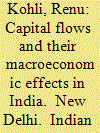

|
|
|
|
|
| Publication |
New Delhi, Indian Council for Research on International Economic Relations, 2001.
|
| Description |
41p.
|
|
|
|
|
|
|
|
|
|
|
|
Copies: C:1/I:0,R:0,Q:0
Circulation
| Accession# | Call# | Current Location | Status | Policy | Location |
| 044440 | 332.041/KOH 044440 | Main | On Shelf | General | |
|
|
|
|
| 3 |
ID:
014724
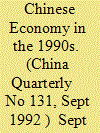

|
|
|
| 4 |
ID:
186436


|
|
|
|
|
| Summary/Abstract |
The Saudi agricultural sector relies on diesel for irrigation that is provided to farmers at a price much lower than the average global price, implying significant opportunity costs. By soft-coupling power and macroeconometric models, we assessed cost and economic (macro and sectoral) implications of electrifying irrigation activities in the Saudi agricultural sector via three scenarios: electrifying each individual farm with a dedicated hybrid renewable micro-grid, electrifying the entire farm cluster with central generation, and connecting the entire cluster to the national grid. Compared with the base-case, connecting the farm cluster to the national grid was the most economic but least environmentally friendly. The renewable and central generation scenarios were costlier due to high battery costs and gas infrastructure needed, respectively. Further, the financial viability of the renewable microgrid option depends on the opportunity cost assumption. From an economic (macro and sectoral) perspective, we found that: (i) job and value-added creation effects of saved-diesel spending from export revenues is positive, but quite small implying the more diesel displaced the more benefits realized, (ii) sectoral-specific spending is more growth- and employment-enhancing than general-spending of the government suggesting taking measures to further enhance the efficiency of governmental spending as highlighted in the Fiscal Sustainability Program
|
|
|
|
|
|
|
|
|
|
|
|
|
|
|
|
| 5 |
ID:
083234
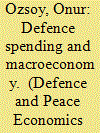

|
|
|
|
|
| Publication |
2008.
|
| Summary/Abstract |
This study uses a six-variable vector autoregressive (VAR) model and analyses the relationship between defence spending as a percentage of GNP, government budget as a percentage of GNP, total deficit as a percentage of GNP, the GNP growth rates, inflation rates, and government budget deficit as a percentage of GNP for the case of Turkey from 1933 to 2004. The impulse response functions (IRFs) are also derived and Granger causalities among the variables estimated. The results support the short-run causality between defence spending and economic growth.
|
|
|
|
|
|
|
|
|
|
|
|
|
|
|
|
| 6 |
ID:
109743
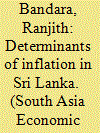

|
|
|
|
|
| Publication |
2011.
|
| Summary/Abstract |
A high and sustained economic growth in conjunction with low inflation is the central objective of macroeconomic policy formulation in both developed and developing countries. Further, studying inflationary processes is an important issue in the current scenario as it allows policy-makers to achieve monetary and economic targets. However, it is not an easy task, especially in developing coun-tries, where economic processes are highly unstable and volatile. The situation in Sri Lanka is not exceptional. Therefore, understanding the behaviour of inflation is vital for the policy-makers in macroeconomic management as Sri Lanka is currently moving into new era of economic development. This article investigates the determinants of inflation in Sri Lanka during 1993-2008, a period which was characterized by upward and downward trends in the economy. Vector auto-regressive (VAR) models were used to find out appropriate explanations for inflation with accompanied application of Granger Causality Tests. The overall findings of estimated VAR models imply that the money supply, exchange rate and the GDP have information which helps in exploring the behaviour of the inflation in Sri Lanka.
|
|
|
|
|
|
|
|
|
|
|
|
|
|
|
|
| 7 |
ID:
069434


|
|
|
|
|
| Publication |
New York, McGraw-Hill Book Company, 1971.
|
| Description |
x, 278p.
|
| Standard Number |
0070465169
|
|
|
|
|
|
|
|
|
|
|
|
Copies: C:1/I:0,R:0,Q:0
Circulation
| Accession# | Call# | Current Location | Status | Policy | Location |
| 006922 | 330/NIC 006922 | Main | On Shelf | General | |
|
|
|
|
| 8 |
ID:
103175


|
|
|
|
|
| Publication |
2011.
|
| Summary/Abstract |
We draw on existing surveys on the economics of terrorism, classifying the contributions to the field by theme, main approach and methodology. Research articles are divided into the themes: Definition and measurement of terrorist activities; Nature of terrorists; Utility cost of terrorism; Impact of terrorism on aggregate output; Terrorism and specific sectors of activity; Terrorism and economic policy; and Counter-terrorist policies. For the set of papers examined, as well as for each theme, we divide the papers by main approach - macroeconomic/microeconomic - and methodology - theoretical/empirical. We find wide variation in approach/methodology across research themes, suggesting extensive research opportunities.
|
|
|
|
|
|
|
|
|
|
|
|
|
|
|
|
| 9 |
ID:
043359


|
|
|
|
|
| Publication |
Cambridge, University Press, 1969.
|
| Description |
ix, 288p.
|
|
|
|
|
|
|
|
|
|
|
|
Copies: C:1/I:0,R:0,Q:0
Circulation
| Accession# | Call# | Current Location | Status | Policy | Location |
| 002535 | 330.960/WHE 002535 | Main | On Shelf | General | |
|
|
|
|
| 10 |
ID:
150924
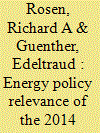

|
|
|
|
|
| Summary/Abstract |
Research which attempted to determine the macroeconomic importance of mitigating climate change through 2100 was presented primarily in Chapter 6 of the 2014 IPCC Working Group III report. Some of the findings of this chapter were then summarized in the Summary for Policy Makers (SPMs) of both the Synthesis Report, and the WGIII report. Unfortunately, these SPMs omitted key aspects of what the overall macroeconomic results for the costs and benefits of mitigating climate change actually did and did not include, how they were produced, and a careful assessment of their uncertainty and scientific validity. Yet, many of the major omissions were acknowledged deep in the text of Chapter 6, but were not revealed to the public. We conclude, therefore, that neither of these SPMs was useful for energy policy makers and energy managers, and they were misleading due to their many key omissions. Finally, we recommend several improvements that can be made to integrated assessment modeling methodologies so that the macroeconomic analysis of mitigating climate change resulting from the use of such models can be more relevant and useful to energy policy makers in the future, and can be communicated to them better.
|
|
|
|
|
|
|
|
|
|
|
|
|
|
|
|
| 11 |
ID:
127912


|
|
|
|
|
| Publication |
2014.
|
| Summary/Abstract |
Ireland imports 88% of its energy requirements. Oil makes up 59% of total final energy consumption (TFC). Import dependency, low fuel diversity and volatile prices leave Ireland vulnerable in terms of energy security. This work models energy security scenarios for Ireland using long term macroeconomic forecasts to 2050, with oil production and price scenarios from the International Monetary Fund, within the Irish TIMES energy systems model. The analysis focuses on developing a least cost optimum energy system for Ireland under scenarios of constrained oil supply (0.8% annual import growth, and -2% annual import decline) and subsequent sustained long term price shocks to oil and gas imports. The results point to gas becoming the dominant fuel source for Ireland, at 54% total final energy consumption in 2020, supplanting oil from reference projections of 57% to 10.8% TFC. In 2012, the cost of net oil imports stood at €3.6 billion (2.26% GDP). The modelled high oil and gas price scenarios show an additional annual cost in comparison to a reference of between €2.9bn and €7.5bn by 2020 (1.9-4.9% of GDP) to choose to develop a least cost energy system. Investment and ramifications for energy security are discussed.
|
|
|
|
|
|
|
|
|
|
|
|
|
|
|
|
| 12 |
ID:
116157


|
|
|
| 13 |
ID:
107996
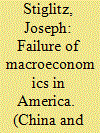

|
|
|
|
|
| Publication |
2011.
|
| Summary/Abstract |
On 18 March 2011, the China Association for World Economics hosted "The Presentation of the 2010 Pushan Award for Excellent Papers on International Economics" at the China Central University of Finance and Economics. Over 700 scholars and students from home and abroad attended the ceremony. Professor Joseph Stiglitz, the winner of the Nobel Prize in Economics, presented the awards and gave a speech on "The Failure of Economics in America." The following speech transcript has been approved and edited kindly by Professor Stiglitz.
The editor thanks Eamon Kircher-Allen for assistance.
|
|
|
|
|
|
|
|
|
|
|
|
|
|
|
|
| 14 |
ID:
116305
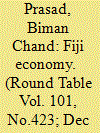

|
|
|
|
|
| Publication |
2012.
|
| Summary/Abstract |
Twenty-five years since the first military coup in 1987, Fiji continues to muddle through both politically and economically. The promise of a general election under a race-free constitution remains the fervent hope of all citizens. Economically the country continues to slide downwards, reflected in poor economic growth in 2010 and 2011. A poor level of private sector investment remains a feature of the macroeconomic picture, and it is unlikely to change for the foreseeable future. This article provides an overview of the Fiji economy and reflections on future prospects.
|
|
|
|
|
|
|
|
|
|
|
|
|
|
|
|
| 15 |
ID:
043337


|
|
|
|
|
| Publication |
London, WeidenFeld and Nicolson, 1987.
|
| Description |
x,443p.
|
| Standard Number |
0297788418
|
|
|
|
|
|
|
|
|
|
|
|
Copies: C:1/I:0,R:0,Q:0
Circulation
| Accession# | Call# | Current Location | Status | Policy | Location |
| 028343 | 339/HOL 028343 | Main | On Shelf | General | |
|
|
|
|
| 16 |
ID:
156802
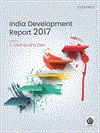

|
|
|
|
|
| Publication |
New Delhi, Oxford University Press, 2018.
|
| Description |
xxvi, 270 + A1.1-A9.2 p.: tables, figures, boxespbk
|
| Standard Number |
9780199483549
|
|
|
|
|
|
|
|
|
|
|
|
Copies: C:1/I:0,R:0,Q:0
Circulation
| Accession# | Call# | Current Location | Status | Policy | Location |
| 059258 | 338.954/DEV 059258 | Main | On Shelf | General | |
|
|
|
|
| 17 |
ID:
041221


|
|
|
|
|
| Publication |
London, WeidenFeld and Nicolson, 1968.
|
| Description |
x, 254p.
|
|
|
|
|
|
|
|
|
|
|
|
Copies: C:1/I:0,R:0,Q:0
Circulation
| Accession# | Call# | Current Location | Status | Policy | Location |
| 004007 | 339.32/BEC 004007 | Main | On Shelf | General | |
|
|
|
|
| 18 |
ID:
045563


|
|
|
|
|
| Publication |
DelhI, Vikas Publications, 1971.
|
| Description |
x, 164p
|
|
|
|
|
|
|
|
|
|
|
|
Copies: C:1/I:0,R:0,Q:0
Circulation
| Accession# | Call# | Current Location | Status | Policy | Location |
| 008181 | 339.501/SHA 008181 | Main | On Shelf | General | |
|
|
|
|
| 19 |
ID:
040692


|
|
|
|
|
| Edition |
2nd ed
|
| Publication |
New York, Harcourt, Brace & World, Inc., 1966.
|
| Description |
xvi, 591p
|
| Standard Number |
0155512021
|
|
|
|
|
|
|
|
|
|
|
|
Copies: C:1/I:0,R:0,Q:0
Circulation
| Accession# | Call# | Current Location | Status | Policy | Location |
| 004837 | 339.5/SHA 004837 | Main | On Shelf | General | |
|
|
|
|
| 20 |
ID:
130917
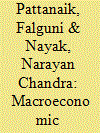

|
|
|
|
|
| Publication |
2014.
|
| Summary/Abstract |
Despite India's resurgent growth over the past years, the country seems to have failed miserably on the employment front. The employment content of economic growth-the employment intensity of growth-is on the decline. The objective of the present study is to identify the macroeconomic determinants which influence the employment intensity of growth in India. The study covers data for the period 1993-94 to 2009-10 across 15 major Indian states and applies a panel data model to find out these determinants. The results tend to suggest that labour supply, economic structure, price instability and human capital are major determining factors. Pro-employment growth in India may require measures like diversification of economic activities towards labour-intensive sectors, price stability, skill-based education and adoption of labour-intensive technology.
|
|
|
|
|
|
|
|
|
|
|
|
|
|
|
|
|
|
|
|
|